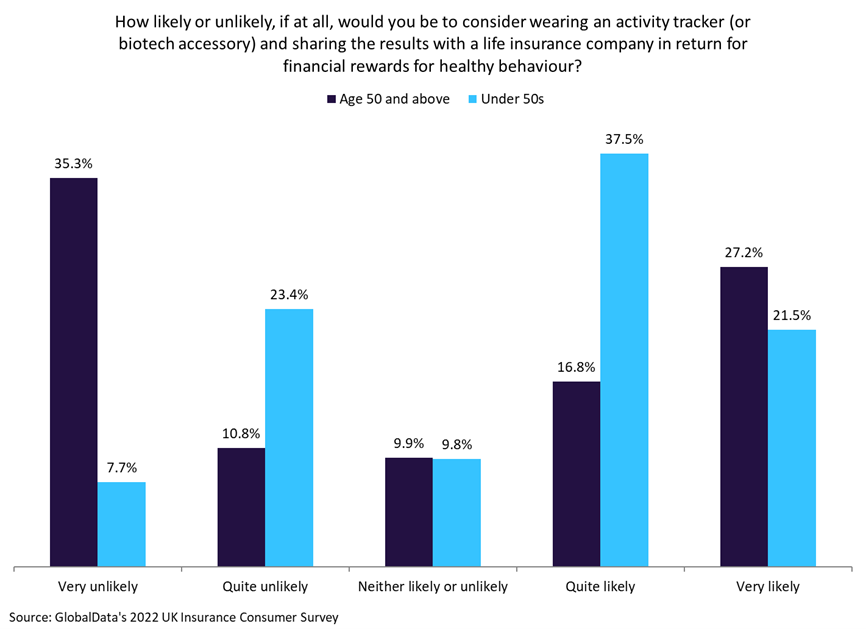Meanwhile, GlobalData surveying has found that younger consumers are much more likely than older consumers to consider wearing an activity tracker and share the results with a life insurance company in return for financial rewards.
As per GlobalData’s 2022 UK Insurance Consumer Survey, 44.0% of consumers aged 50 and over are likely (to some extent) to consider wearing an activity tracker and sharing the results with a life insurance company for financial rewards. This figure rises to 59.0% for consumers who are younger than 50. Likewise, 35.3% of consumers aged 50 and over are very unlikely to engage in such activity compared to 7.7% for under-50s.

The insights from Vitality on incentives come from analysis of members’ exercise habits at different ages. Members of all ages can track their physical activity to earn points and rewards. According to Vitality, while members of all ages are highly active, those over the age of 50 record 11.3% more active days monthly (15.7) than those younger than them (14.1).
In addition, one of the most popular rewards is the Apple Watch, and older members are also benefiting from this the most. Vitality stated that, on average, those over 60 using this benefit improved their activity by 15% more than those under 30.
To capitalise on the findings from Vitality and GlobalData, insurers could tailor incentive programmes to cater to the preferences of specific age groups. For instance, focusing on financial-driven rewards might attract younger demographics, while offering rewards that align with the lifestyles and needs of older customers could prove more effective. By leveraging these insights, insurers can better engage their customer base and foster healthier habits while enhancing customer loyalty and satisfaction.
However, there are barriers to the uptake of wearable devices. As per GlobalData’s 2022 UK Insurance Consumer Survey, the main reasons consumers would not be willing to wear an activity tracker and share the results with a life insurance company are because they do not want to wear a device (42.2%), the devices share too much personal data (34.3%), and they have privacy concerns (25.5%). Insurers can combat this by focusing on transparency and education to alleviate concerns related to personal data sharing. By clearly communicating how data will be used, stored, and protected, insurers can build trust and ease worries about privacy. Overall, insurers can capitalise on the willingness of UK consumers to engage in incentive programmes and use wearable devices. However, they must first tackle the barriers preventing consumers from participating in these activities.
How well do you really know your competitors?
Access the most comprehensive Company Profiles on the market, powered by GlobalData. Save hours of research. Gain competitive edge.

Thank you!
Your download email will arrive shortly
Not ready to buy yet? Download a free sample
We are confident about the unique quality of our Company Profiles. However, we want you to make the most beneficial decision for your business, so we offer a free sample that you can download by submitting the below form
By GlobalData







Related Company Profiles
Apple Inc